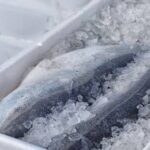Guppy owners often ponder the possibility of simplifying their fish feeding routines by using the same food for different species, specifically feeding guppies with betta fish food. Understanding this is crucial for the health of your guppies, as their dietary needs are specific and vital for their well-being. Guppies are omnivores, requiring a balance of plant and animal-based nutrients to thrive.
While betta food might seem convenient for those keeping both guppies and bettas, it’s primarily formulated for the carnivorous diet of bettas, characterized by high protein content. Guppies, on the other hand, also need plant material for optimal health. Therefore, assessing whether betta food can meet all the nutritional needs of guppies or if prolonged use could lead to deficiencies or health issues is essential. Knowing the dietary needs of guppies along with the composition of betta food will help determine the suitability of this diet for your guppies.
An adult guppy enjoys a meal. Ensuring a balanced diet is crucial for their health and vibrant colors.
Understanding Guppy Dietary Requirements
Before exploring whether guppies can eat betta food, it’s important to recognize their unique dietary requirements, which include a mix of plant and animal-based nutrients for optimal health.
Nutritional Needs of Guppies
Guppies need a variety of nutrients to stay healthy. As omnivores, their diet should include both plant and animal matter to ensure a balanced intake. Protein is essential for growth and tissue repair. However, excessive protein can lead to obesity and related health problems.
- Proteins: Vital for muscle and fin development.
- Carbohydrates: Needed in smaller amounts for energy.
- Fats: Important for energy and growth but should be limited to prevent obesity.
- Vitamins and Minerals: Essential for immune system health and preventing digestive issues.
Guppy Growth and Development
Healthy maturation requires a well-balanced diet. Nutrition significantly impacts their vitality, coloration, and overall well-being. Too much protein can be as detrimental as too little, causing nutrient deficiencies or digestive issues. Feed small amounts several times a day to aid proper digestion, reduce waste, and lower the risk of tank contamination. Their diet should include high-quality flake food, freeze-dried, or live foods to mimic their natural diet.
A group of guppies consume flakes. A varied diet of both plant and animal matter is crucial for their health.
Exploring Betta Food Composition
When considering betta food, it’s important to consider the specific dietary needs of betta fish, which are formulated to meet their carnivorous, protein-rich diet.
Protein Content in Betta Food
Betta food is designed with high protein content to cater to the carnivorous nature of bettas. Pellets and flakes specifically made for betta fish often include significant amounts of fish or shrimp meals and other meat-based ingredients. These components ensure that betta fish receive the protein necessary to support bodily functions and maintain good health. The protein levels in betta food are typically higher than those in foods designed for omnivorous fish.
Comparison with Guppy Food
Compared to guppy food, betta food is far more protein-rich. Guppies need a balanced diet, including both meat-based food and plant matter. While guppies can eat betta food, it should not be their main source of nutrition. Betta pellets also include a range of vitamins and minerals to support their overall well-being, but guppies have different nutritional needs. A diverse diet is essential to avoid deficiencies and promote optimal health.
Betta food pellets, typically high in protein. While suitable for bettas, they should only be given to guppies as an occasional treat.
Safety of Betta Food for Guppies
When considering betta food for guppies, it’s important to evaluate potential risks and how well their digestive system can adapt to a different diet.
Potential Risks and Allergens
Betta food often contains higher protein and fat levels, which might not align with the nutritional needs of guppies, who need a balanced diet of both plant and animal matter. Excessive proteins and fats can lead to digestive issues and obesity. Also, look for any allergens that might be present in betta food, which can cause adverse reactions. A diet not suited to their nutritional needs can lead to stress, which might increase aggression amongst guppies. Uneaten or over-consumed betta food could spoil and contribute to bacteria or parasite growth in the tank environment, potentially harming the guppy population.
Adaptability of Guppy Digestive System
The guppy digestive system can handle varied diets, but betta food might not provide all necessary nutrients. Guppies need both animal and plant-based food components. While they can consume betta food, it shouldn’t replace their typical balanced diet. Relying solely on betta food can lead to nutritional deficiencies and health problems over time. Betta food might be too dense or rich for guppies, resulting in bloating or constipation. Regular guppy food contains a balance of vitamins and minerals that might be lacking in betta-specific formulations.
Feeding Guppies Betta Food
When considering feedings for guppies, understand the potential of betta food as a supplement. Gauge both the frequency and the quantity, as well as ensure variety in their diet to maintain optimal health.
Frequency and Quantity Considerations
Betta food, primarily in the form of pellets or flakes, can be fed to guppies, but administer it as an occasional treat rather than a dietary staple. Betta food is high in protein, which suits the largely carnivorous bettas, but guppies need a more balanced diet. Feed them betta food no more than once or twice a week and in small quantities to prevent overfeeding. For guppy fry, provide finely ground food to accommodate their tiny mouths.
Variety in the Guppy Diet
Guppies truly thrive on a varied diet that satisfies their omnivorous needs. In addition to sparingly offered betta food, include a mix of live foods, frozen foods, and freeze-dried options to enrich their diet. Foods like brine shrimp or daphnia offer excellent nutrients. Live and frozen foods stimulate natural feeding behaviors and provide essential nutrition for vibrant growth and health. An occasional indulgence in high-protein betta pellets or flakes can be beneficial, but balance it with other food sources to prevent dietary deficiencies.
A female guppy swims with her fry. Young guppies require finely ground food to aid in their development.
Impact on Guppy Health and Behavior
The type of food guppies consume can significantly impact their physical health and behavior. Choosing the right diet is crucial for their well-being.
Nutrition and Immune System
Guppies need a balanced diet, catering to their omnivorous nature, that includes both plant and animal matter. Betta food, which is high in protein and designed for carnivorous fish, can disrupt this balance. Guppies fed exclusively on betta food may face health issues such as obesity and related stress. A varied diet supports a strong immune system, while deficiencies can lead to increased susceptibility to diseases. Vitamins such as Vitamin C are essential for enhancing their immune system.
Behavioral Changes
Dietary imbalances can lead to behavioral changes. Aggression, not normally associated with these peaceful fish, may increase when their dietary needs aren’t met. Guppies that are overfed or consuming inappropriate food can exhibit signs of stress, compromising their overall well-being. A suitable diet contributes to more relaxed and natural behavior, allowing them to thrive in a community setting.
Aquarium Management for Mixed Diets
When managing an aquarium where guppies and bettas coexist, create a balanced environment that meets the dietary needs of both species. Understanding their specific requirements is crucial for a harmonious community tank.
Creating a Harmonious Environment
For a community tank housing both bettas and guppies, prioritize the setup to prevent territorial disputes, common with bettas known for their aggressive behavior. Add plants and decorations to allow guppies to hide. A spacious tank gives enough room for each fish to establish its territory to prevent stress and aggression.
Monitoring Food Consumption
Provide a mix of foods suitable for both bettas, who are primarily carnivorous, and guppies, who are omnivorous. This approach often involves offering high-protein betta food in moderation, alongside a balanced diet for guppies. Observe how the fish consume their meals, ensuring that both species have access to food without one outcompeting the other.
Alternative Dietary Options
When considering the dietary needs of guppies, provide a mix of nutritional alternatives that cater to their omnivorous nature.
Plant-Based and Live Food Alternatives
Offer guppies various types of vegetables such as blanched spinach, lettuce, cucumber, and zucchini. These are not only nutritious but also help to replicate their natural diet. Additionally, algae, an essential component in a guppy’s diet, can be included either by cultivating it in the tank or by providing algae wafers.
For a more protein-rich diet, live food options like daphnia, bloodworms, and mosquito larvae serve as excellent alternatives. It’s crucial to feed these sparingly since an overdose of protein can lead to health issues. Ensure that any live food you offer is clean and free from disease to prevent any health complications.
Homemade Guppy Food Recipes
Creating homemade food gives you control over what goes into your guppies’ diet. A simple recipe includes a mix of pureed vegetables, such as carrots and peas, blended with an animal-based component like bloodworms or brine shrimp. Another option is gel food using pureed vegetables and unflavored gelatin as a binder. For added nutrition, mix in a pinch of spirulina powder or crushed egg yolk. Alternating these foods with high-quality flake food ensures your guppies receive all the necessary nutrients to thrive. Pay close attention to the variety and balance to promote good health and vibrant colors.
Frequently Asked Questions
What constitutes a well-balanced diet for guppies?
A well-balanced diet for guppies includes a mix of both plant and animal-based foods. They thrive on a diet including high-quality flake foods, frozen or live brine shrimp, daphnia, and occasionally vegetable matter.
Are guppy pellets a suitable sole food source for guppies?
While guppy pellets are formulated to provide balanced nutrition, supplement them with a variety of other foods to ensure they receive all the necessary nutrients and to prevent dietary deficiencies.
Is it safe for guppies to consume foods formulated for other fish species like mollies or tetras?
Yes, guppies can safely consume foods formulated for similar fish species such as mollies or tetras. However, always ensure these foods meet the dietary requirements specific to guppies’ omnivorous needs.
Can betta flakes or pellets be used as an occasional food for guppies?
Betta flakes or pellets can be used as an occasional treat for guppies. These fish foods are often high in protein and can be a good supplement, as long as it’s given in moderation.
What alternative foods can guppies have if their standard food is unavailable?
In times when standard food is scarce, feed them alternatives like boiled vegetables, such as lettuce or zucchini, and even homemade gel food mixes to keep them healthy.
What types of live foods are appropriate for guppies to eat?
Live foods to give guppies include brine shrimp, bloodworms, and micro worms. These are excellent sources of protein and can enhance their growth and vitality.

